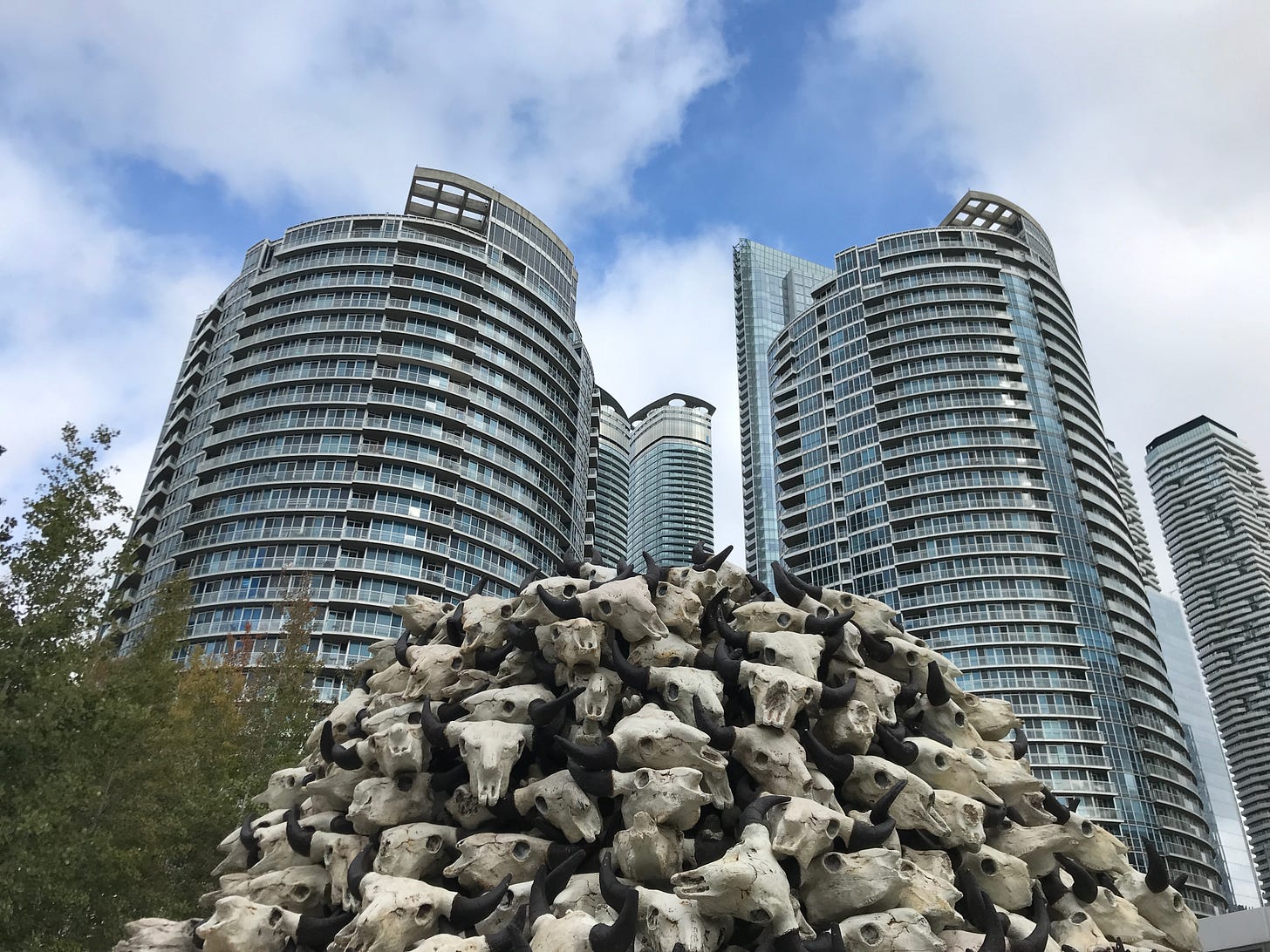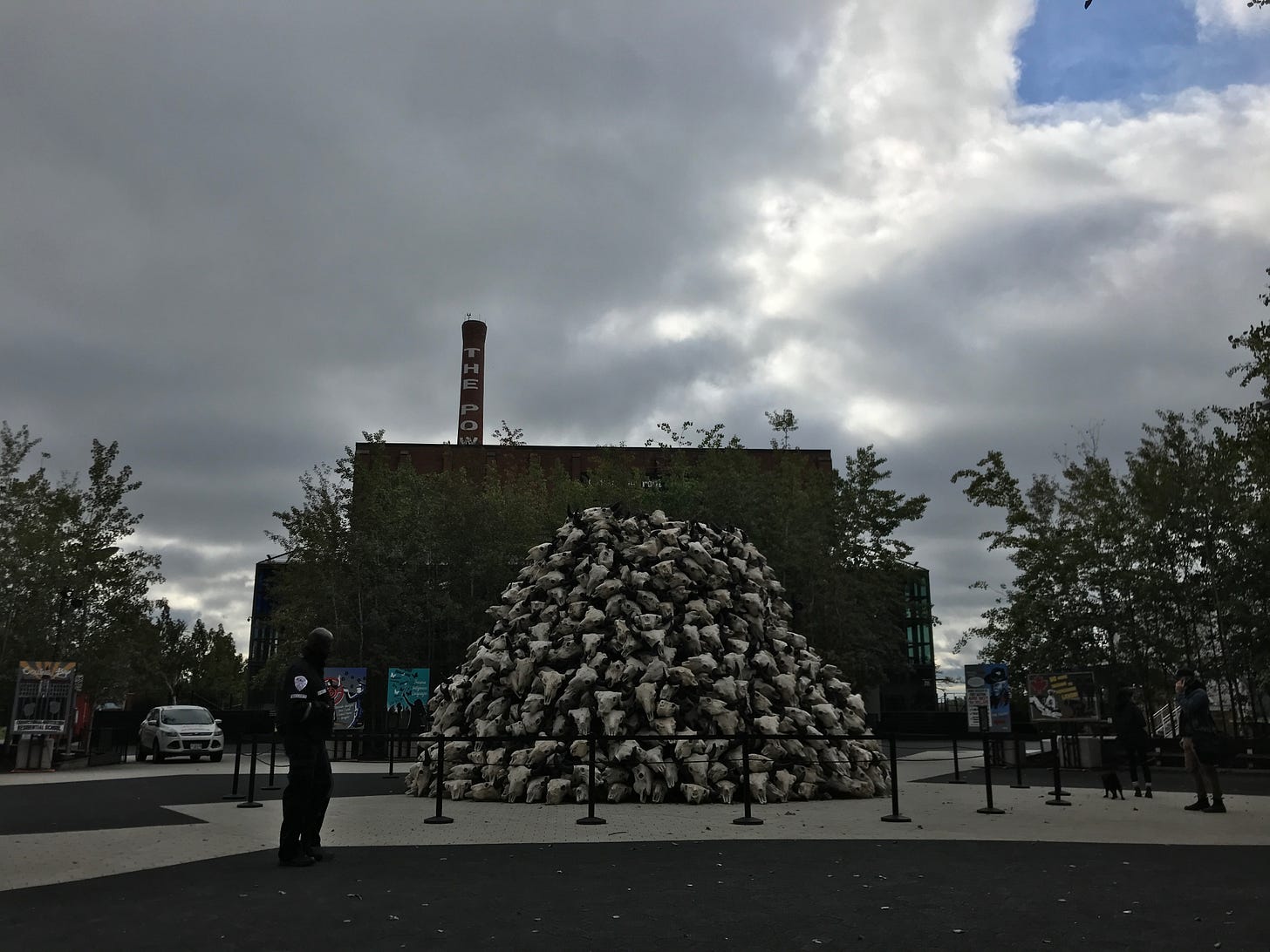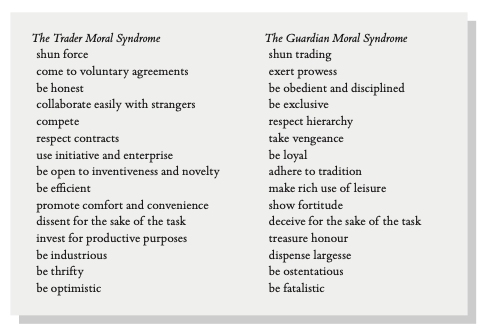The Skulls Remain
I came to poetry because I needed a language that was beyond ordinary. — Joy Harjo
They were placed there last October, an art installation, as a physical reminder, by the artist Jay Soule/Chippewar, but seeing the installation, I had the sense that they had always been there, will always be there, hovering just out of sight.
A near total incongruity—buffalo skulls beside Lake Ontario, at the foot of Simcoe Street in Toronto, the glass condos surrounding, the heavy, vertiginous infrastructure of Queens Quay West—made the skulls look from a distance like a drawing superimposed, a projected image toying with my perception, a trick of the mind that would take the brain some work to make sense of.
And this incongruity seemed, in a way, the point of Soule’s Built on Genocide: to bring the mass killing into the light, into plain view, onto the Queen’s Quay, onto the doorstep. And the rope fencing off the exhibit—in a way, that rope was presenting as the state, maintaining its zone around the bones, interrupting Soule’s work and its intention. It seemed fitting, ultimately, that the rope was there, a system of policing standing out front as co-creator, as sponsor of the extinction.
A security guard was minding the outdoor exhibit, ensuring no defacement and no approach took place, guarding the integrity of the work, protecting history from the present. I wonder what would have happened if there was no guard. It felt a bit like without him those bones would vanish, would float into the air. Would the piece have been tagged or defaced? Would children have climbed on it? Would it have become part of the landscape of the square? Would the mind-trick have faded?
The guard and I talked for a while about the power that pile of bones contained, sitting in the middle of Harbourfront Centre. “It’s telling the truth,” he said. “It’s not what you learned in school. It’s the truth.” I asked him what walking around this exhibit day to day has done for him, what it seems to be doing for the people who see it.
“Canada has a lot of work to do,” he said. “And this is just the start.”
I have tried to write this thing calmly
even as its lines burn to a close. I have come to know
something simple. Each sentence realised or
dreamed jumps like a pulse with history and takes a
side.
— Dionne Brand The work of poetry, how I understand it, includes trying to get closer to the substance of existence through the calling up of language and its music. It includes recording what’s seen and sensed—what I understand to be there, what language appears in reply—and then turning that act of seeing and sensing on the language itself.
It’s always a failure. Language is not built to bring you closer to the substance of existence. It’s an approximation: you read a poem and can intuit what propels it, sense what the poet sensed in the distance, shimmering beyond reach.
This work is also a way to look at profoundly difficult things with what Jeanette Armstrong calls the “four main capacities” within the individual: the physical self, the emotional self, the thinking-intellectual self, and the spiritual self. Poetry, any art, has the ability to offer a view on decimation that doesn’t itself destroy. And I sense this might be at least in part because it expresses an idea of the good. It takes a side.

Forgetting, I would even say historical error, is an essential factor in the creation of a nation and it is for this reason that the progress of historical studies often poses a threat to nationality. Historical inquiry, in effect, throws light on the violent acts that have taken place at the origin of every political formation, even those that have been the most benevolent in their consequences. Unity is always brutally established.
— Ernest Renan These days I find myself returning to an essay, first published in Brick, by Jan Zwicky, called “A Note on Jane Jacobs’s Systems of Survival, or Why We Will Not Be Able to Prevent Global Ecological Collapse.” In it, Zwicky describes Jacobs’s discernment of a fundamental divide between two sets of virtues, which Zwicky labels the canonical virtues (“courage, self-restraint, sagacity or wisdom, and justice”) and the shadow virtues (“trickery and thievery; impulsive bravado; clever deceit; ham-fisted violence in males”). Jane Jacobs, in an attempt to understand “intractable problems facing North American society,” discerns two differing moral codes at work, two sides fiercely at odds: the “traders” and the “guardians.” In her essay, Zwicky lists their terms, as Jacobs perceives them, then offers some present-day examples:
So-called “traders” condemn violence and value cooperation, transparency, and social equality; so-called “guardians” condemn trading and value the hierarchical organization of power, displays of prowess, secrecy, and an us-versus-them approach to the world. Examples of guardian institutions in global corporate consumer culture include the Mafia, the NSA, CSIS, the military, some religious orders, industrial monopolies, the police, aristocracies, government bureaucracies; and they used to include symphony orchestras and the academy. Traders “institutionalize” less often; the style is epitomized in the person running a small, innovative business, or volunteer collectives seeking to better their communities.
Two main points form the crux of Zwicky’s essay: 1) to remedy irreversible ecological catastrophe would require a profound ideological shift to a mainly trader mentality (and good luck with that), and 2) humanity—guardians and traders both—is plagued by a raging case of pleonexia, “a desire for more and more, a desire for more than enough,” to the point that humanity is proving to be “a form of life, a version of wanting, that got too good at getting.”
The first point of Zwicky’s, above, might help explain the incredulity on the part of us trader types at the sight of these extreme guardians still stomping around Ottawa, blocking the Alberta-Montana border. We can’t understand what propels them. It’s like there’s a completely different idea of what’s good and right at play.
The second point, these days, tells me something useful about what’s propelling those unvaccinated truckers et al.: their demands for “freedom” are actually demands for a sort of pleonectic impunity. They want what they already have lots of. They want more and more. They want all of it.
Those skulls have been gone for months now, but they remain, in the mind’s eye.








Eloquent and provocative. Thank you. Provocative because it dares me to differ with you on the role of poetry. You are not categorical, of course. You have given at least two layers of qualification yourself when you say
"Poetry, any art, has the ability to offer a view on decimation that doesn’t itself destroy. And I sense this might be at least in part because it expresses an idea of the good. It takes a side."
A traderly optimism, but with a little fatalism at the edges?.
Poetry has an ability to deal with violence without doing violence (if I may paraphrase?), yes. But also an ability not to. War poetry was not always about peace. We need only go back to Kipling or Tennyson. And though we have a progressive, pacifist tradition right now in Canada, there are no guarantees. "No genocide without poetry" as Zizek says, and as D.C. Scott illustrates.
"At least in part because it expresses an idea of the good," yes. In part. And which good? Nationhood? Which nation.
Despite my quibbling, I still have to agree at the last qualification -- taking sides. That's an option we must take or fade into irrelevance, as individual poets and responsible citizens. However dangerous it may be to do so.